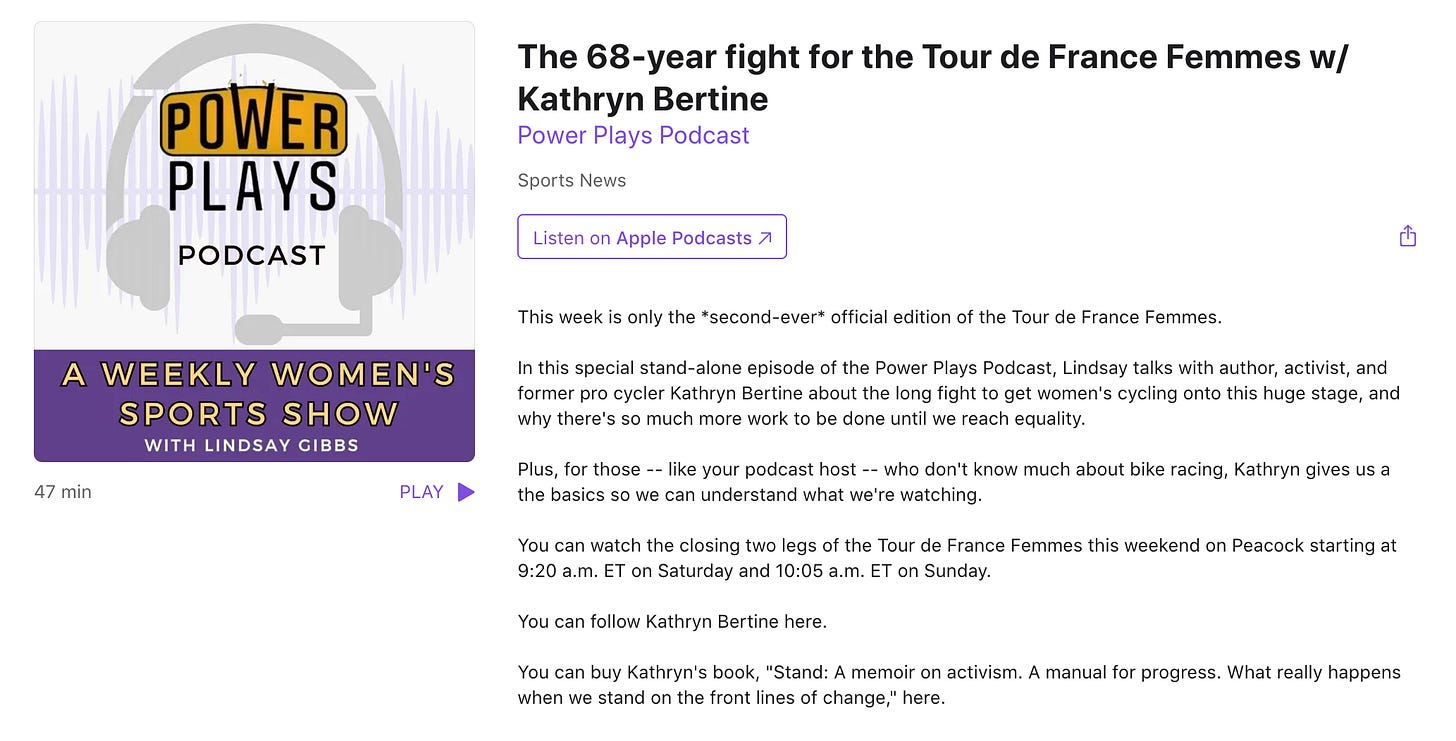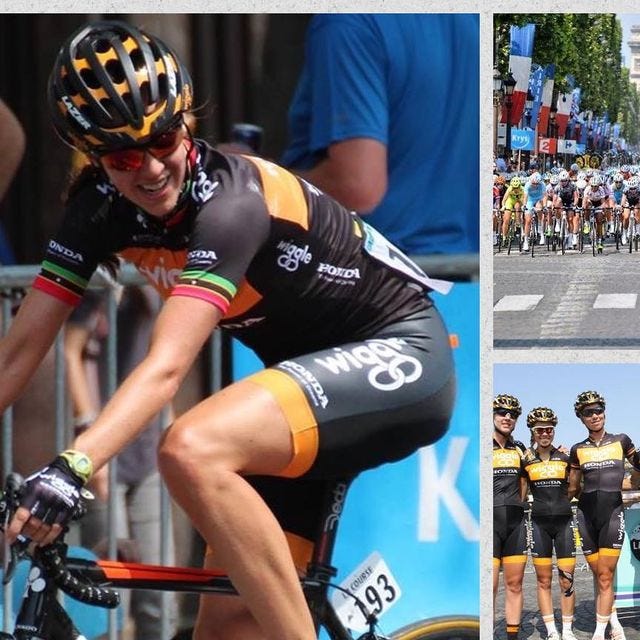PODCAST: The 68-year fight for the Tour de France Femmes w/ Kathryn Bertine
Also: If you prefer your content in newsletter form, I've got you covered.
Hello, friends! I hope you’re all doing well.
What a week. What a month. There are so many exciting things happening right now in the women’s sports space that it’s hard to catch my breath. And that? Is the best feeling to have. (Outside of a vacation nap, obv.) Be sure to check out the Power Plays Instagram for a watch schedule for this weekend’s women’s sports action.
It’s easy for other women’s sporting events to get lost in the shuffle during the Women’s World Cup, because there are only so many hours in the day. But I didn’t want this week to pass us by without giving proper attention to the Tour de France Femmes, which is actually in only its *second year* — well, kind-of. You’ll understand better in a bit.
On Thursday, I was lucky enough to talk with Kathryn Bertine, an author, advocate, former pro cyclist, and one of the driving forces behind getting the Tour de France Femmes off of the ground.
You can listen to the interview here, and also subscribe to the Power Plays Podcast on Apple Podcasts or the podcast app of your choice so you’ll get the latest episodes delivered straight to your inbox.
I know that podcasts aren’t everyone’s favorite things, and despite what the last two weeks have showcased — getting a podcast launched takes a lot of singular attention — the newsletter portion of Power Plays isn’t going anywhere. So, I’ve excerpted portions of my conversation with Kathryn below so you can follow along that way if you please.
Okay, friends. Let’s do this.
An interview with Katrhryn Bertine on the long road to the Tour de France Femmes
(Some interview answers have been lightly edited for clarity.)
While this year is the second official Tour de France Femmes, women first raced in the Tour de France in 1955!
The race director in 1955 — who was also the director of ASO, which owns the Tour de France — decided to allow women to race the Tour de France for five days. But he had ulterior motives:
Back in the day, women were not invited to partake in the race. Then in 1955, the race director of the Tour de France … decided that he would invite female cyclists to partake in the race. But he was actually doing it to prove that women women couldn't possibly do it. So he invited them for five days, it was a five-day event. There was something like 45 women, and they all kicked ass. And they proved “Yes, we can do this.” Millie Robinson of the UK was the first winner of the of the Tour de France Féminin, as it was called then. So everyone was like, “Awesome. This is gonna keep going, we proved that we could do this.” And the race director was like, “Oh, shit, they did it? Shut it down.
How cool of him.
It took almost 30 years for women to be invited back to the Tour de France.
Here’s Kathryn on a pivotal year for women in road cyling:
Finally, in 1984, a big change happens and women are allowed to compete in road cycling in the Olympics in the 1984 Los Angeles Games. Of course, that didn't just happen — there were women working behind the scenes lobbying USOC and the cycling federation to finally make this happen. You know, we need to acknowledge that because it's not just like, some guy had this great idea, “Yeah, let's add women!”
So we're super excited that women got into the Olympics. But of course, the distance was like half of the men's. That also was the year that the race director of the 1984 Tour de France, he finally was very, very progressive. And he brought the women into race the entire distance. It might have been 18, not 21 days then. But the women raced every day — their distances were shortened, but only so that they could hold the men and women on the same day, and that they wouldn't overlap.
Six countries in '84 were invited to bring teams. And they were, of course, not well funded … and all the women pretty much had to pay their own way.
Marian Martin of the U.S. was the first (female) winner of the Tour de France in 1984.
Love this, there’s momentum!
Unfortunately, all progress for women was halted in 1989 when the Tour de France became more commercialized.
That lasted 1984 to 1989. Awesome. So six years of racing. Then, in 1989, now it gets a little crappy. By 1989 things are changing in the media, and the Tour de France is thriving, and there are more TV cameras and broadcast networks wanting to come in and cover the Tour de France. So rather than ASO sell rights to both the men's and women's races, they just sold men's rights and then did away with the women's race.
Not only did ASO drop the women’s race from the event, it blocked other groups from starting their own Tour de France for women.
And there are some people that actually said, You know what, we'll just make our own women's Tour de France, we don't need you, we'll make our own. And ASO said, No, you won't, you don't own the name Tour de France, that's ours, if you use it we'll stop you.
When Kathryn’s pro cycling career began and she realized women couldn’t race the Tour de France, she immediately began organizing.
I first got on a road bike in 2007. And then I got pretty good, but I was like, I want to see if I can make it to the pro ranks. And during that journey, I was just looking and admiring all the women ahead of me, of course, and I was like, "Why are there not women at the Tour de France? This doesn't make any sense." I looked into a little history, I saw that women had been there, but why are they not there anymore? And so I began reaching out to ASO, the parent company. I wrote a business plan. And crickets.
They were not responding to my emails. And I kept thinking, maybe, maybe if I get a professional cycling contract, and I'm one of the pros, you know, maybe something will happen. And in 2012, I actually got my first pro contract and cycling … and I'm like, "Now ASO will listen to me." They still don't.
So, Kathryn stepped up her organizing game and joined with some of the most famous names in the sport to pressure ASO.
While working on a documentary about women in cycling, Kathryn joined forces with stars of the sport, such as Marianne Vos, Emma Pooley, and Chrissie Wellington to create an activist group, Le Tour Entier (“the whole tour”), whose main goal was to get a Tour de France race for women. They continued to put public pressure on ASO:
We launched this Change.org petition to ASO for women's inclusion, and also to sit down and have a meeting with them … and that petition gained 98,000 signatures. Which for 2013 was a lot.
The petition worked. Well, partially. In 2014, women got one day of racing at the Tour de France.
Long story short, in July of 2014 La Course by Tour de France was back. And on a personal note, it meant the world to me. I got to stand on the start line of my own dream. That was an amazing moments. But what was interesting too is we lobbied for women's inclusion for the whole tour, right? All 21 days of the Tour de France. ASO was so nervous that anyone would even watch women's pro cycling that they gave us one day. They're like, "Well, we have to see if anyone will watch." Oh, the world watched, it was broadcast over 120 different countries and something like 50 different networks were carrying it. It was so exciting. And we told them, we said, okay, one day for the first year, but only if you promise to implement adding three to five days each year until it's equal, you know. So the first year was such a success that the first thing they did the next day was like, we're doing it again and 2015 -- one day.
Despite the success of La Course, ASO did not grow the women’s race. It remained at one day for the next eight years.
Each year, according to Kathryn, the riders and fans grew more frustrated:
What happened for the next eight years was a did one day, and it was just moving around different parts of France. And during that time, of course, we were like, “Oh my God.” You know, we're losing our minds. We're like, "Seriously? You're not keeping your promise. You're not growing it."
So a few years later, we have the media putting the pressure on, we have the fans putting the pressure on, I of course, I'm still putting pressure on, our group is, all of that. And a wonderful sponsor named Zwift … they came on board. And they pledged four years to back Tour de France Femmes to bring a stage race back.
That brings us to this week’s event, an eight-day race. But equality is still a long way off.
So ASO has granted eight days, which is what's happening now. This is the second edition of Tour de France Femmes happening this year, last year was the first launch of it. And it's amazing. So we went from the one day to the eight days. And we should very much celebrate that progress. And always, always celebrate the athletes. Like these racers are out there throwing down kicking, being awesome. But we also have to acknowledge that this is eight days, the men get 21 days. And on top of this, the distances are shorter. And the prize money is 29% less than what the men made over eight days, right? So on that scale of equal pay for equal play, eight days to eight days, the women were still making 29% less in terms of prize money.
Now so we still have to find this benevolent balance of like cheering on that "Yay, we have eight days and the women are kicking ass and throwing down and being awesome." But we have to chastise ASO to be like," We see what you're doing. And yay progress. But this is not the finish line."
You can watch the final two legs of the Tour de France Femmes on Peacock, beginning at 10:05a.m. ET on Saturday and 9:20 a.m. on Sunday.
And again, you can listen to my entire interview with Kathryn on the Power Plays Podcast.
Thanks so much for your support. Have a great weekend!






